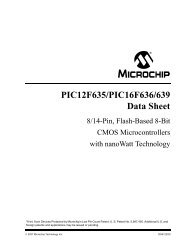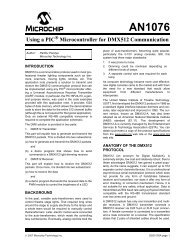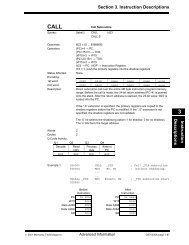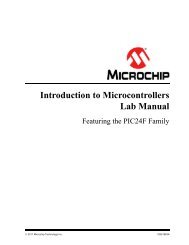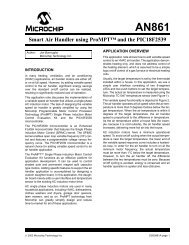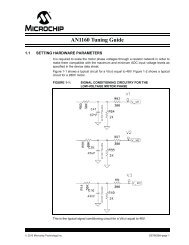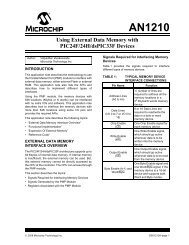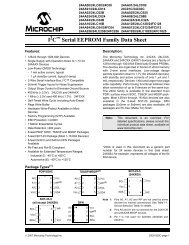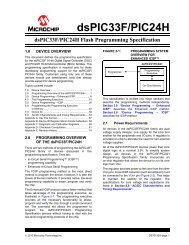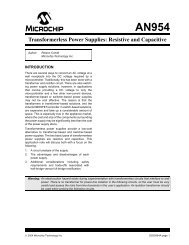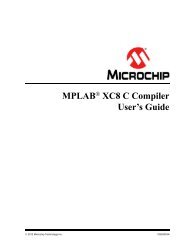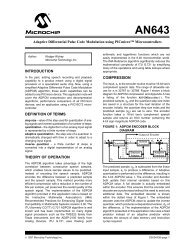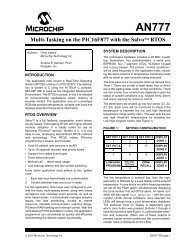MPLAB C Compiler for PIC24 MCUs and dsPIC DSCs ... - Microchip
MPLAB C Compiler for PIC24 MCUs and dsPIC DSCs ... - Microchip
MPLAB C Compiler for PIC24 MCUs and dsPIC DSCs ... - Microchip
You also want an ePaper? Increase the reach of your titles
YUMPU automatically turns print PDFs into web optimized ePapers that Google loves.
16-Bit C <strong>Compiler</strong> User’s Guide<br />
The reverse attribute conflicts with the aligned <strong>and</strong> section attributes. An attempt<br />
to name a section <strong>for</strong> a reverse-aligned variable will be ignored with a warning. It is an<br />
error condition to specify both reverse <strong>and</strong> aligned <strong>for</strong> the same variable. A variable<br />
with the reverse attribute cannot be placed into the auto_psv space (see the<br />
space() attribute or the -mconst-in-code option); attempts to do so will cause a<br />
warning <strong>and</strong> the compiler will place the variable into the PSV space.<br />
section ("section-name")<br />
By default, the compiler places the objects it generates in sections such as .data <strong>and</strong><br />
.bss. The section attribute allows you to override this behavior by specifying that a<br />
variable (or function) lives in a particular section.<br />
struct array {int i[32];}<br />
struct array buf __attribute__ ((section("userdata"))) = {0};<br />
The section attribute conflicts with the address <strong>and</strong> reverse attributes. In both<br />
cases, the section name will be ignored with a warning. This attribute may also conflict<br />
with the space attribute. See the space attribute description <strong>for</strong> more in<strong>for</strong>mation.<br />
secure<br />
This attribute can be used to define protected variables in Secure Segment (SS) RAM:<br />
int __attribute__((secure)) secure_dat[16];<br />
Variables defined in SS RAM will not be initialized on startup. There<strong>for</strong>e all variables in<br />
SS RAM must be initialized using inline code. A diagnostic will be reported if initial<br />
values are specified on a secure variable.<br />
String literals can be assigned to secure variables using inline code, but they require<br />
extra processing by the compiler. For example:<br />
char *msg __attribute__((secure)) = "Hello!\n"; /* not supported */<br />
char *msg2 __attribute__((secure));<br />
void __attribute__((secure)) foo2()<br />
{<br />
*msg2 = "Goodbye..\n"; /* value assigned explicitly */<br />
}<br />
In this case, storage must be allocated <strong>for</strong> the string literal in a memory space which is<br />
accessible to the enclosing secure function. The compiler will allocate the string in a<br />
psv constant section designated <strong>for</strong> the secure segment.<br />
sfr (address)<br />
The sfr attribute tells the compiler that the variable is an SFR <strong>and</strong> also specifies the<br />
run-time address of the variable, using the address parameter.<br />
extern volatile int __attribute__ ((sfr(0x200)))u1mod;<br />
The use of the extern specifier is required in order to not produce an error.<br />
Note: By convention, the sfr attribute is used only in processor header files. To<br />
define a general user variable at a specific address use the address<br />
attribute in conjunction with near or far to specify the correct addressing<br />
mode.<br />
DS51284H-page 16 © 2008 <strong>Microchip</strong> Technology Inc.





